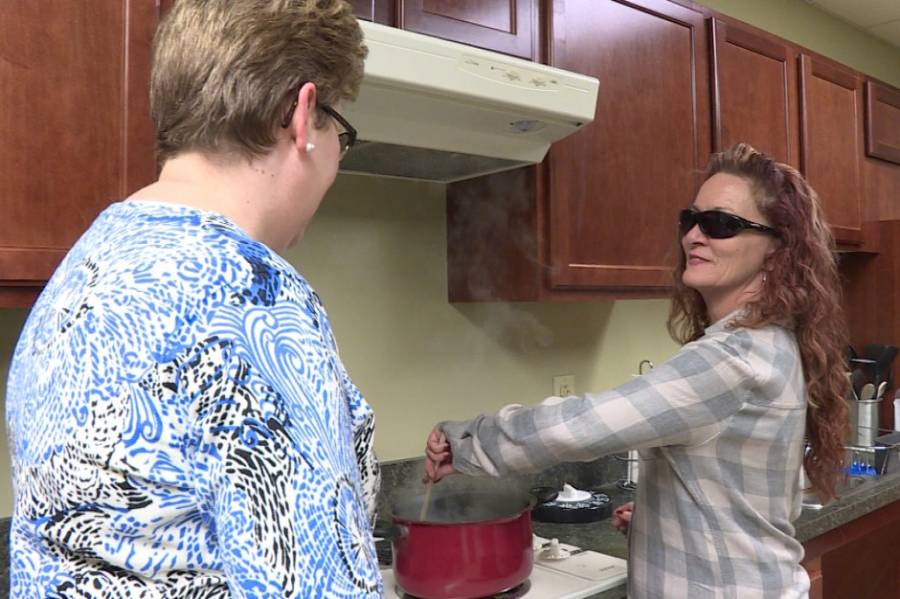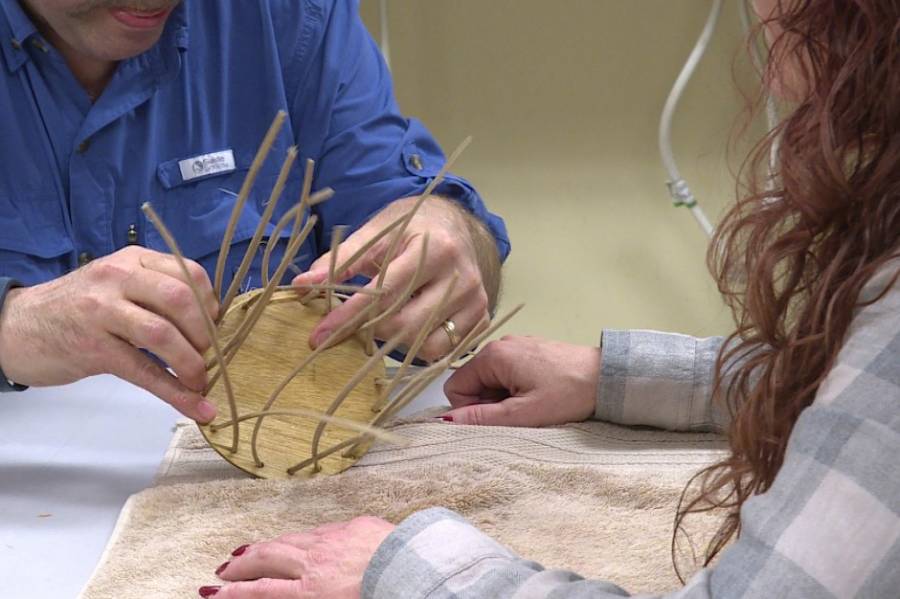
Tina Cox learns the best techniques for cooking in what's called the personal management lab at Bosma Enterprises. Photo: James Vavrek
Tina Cox could put a smile on anyone’s face. She’s funny, full of energy, and life. But a battle with cervical cancer in 2014 led her to lose most of the vision in her left eye and left her with minimal vision in her right. At that time, Cox says she lost her spark.
“It was scary,” Cox says. “I didn’t want to leave my house, I was staying with my mom after my surgery. I relied on everyone for everything, and of course you feel like that your world is over.”
People who experience vision loss can experience depression and difficulty finding opportunities to live a normal life, but Cox eventually decided that’s not an option for her.
“And then finally I decided no it’s not. I have children, I have grandchildren and I have me and I’ve got to go, and so now I’m just nonstop,” Cox says.

A few months ago Cox came to Bosma Enterprises, a nonprofit organization just north of Indianapolis. It’s one of about 90 National Industries for the Blind agencies across the country. They’re all different, but in Indiana, Bosma offers training and employment opportunities.
Cox is going through extensive programs where she’s basically relearning skills to live an independent life, like walking on unknown trails or busy streets. Vice President of program services James Michaels, who’s also blind, says it’s like school.
“They’re here every day. They’re learning how to travel without sight, they’re learning how to cook a meal without sight, they’re learning how to take their medications,” Michaels says.
In what’s called the personal management lab, it’s kind of like a home simulation. There’s a kitchen area, bedroom, and a place to do laundry. There, Cox learns the best practices for cooking and cleaning, for example, which is important to her because she loves to cook.
“At any given time we have 13 to 15 clients going through our center based program and that’s where we look at the whole person and it’s really important when someone’s going through this, they don’t just think, ‘oh, I’m just this blind person,’” Michaels says.

Cox learned how to weave a basket, which helps her gain confidence using her hands again. Photo: James Vavrek
Through the programs, Cox has learned a wide range of skills.
“I’ve learned braille,” she says. “I’ve learned cooking techniques so that I don’t burn myself, I’ve learned manual skill so things around the home, so I can change out a door knob now if I get a bad doorknob at home.”
Cox even learned how to weave a basket, which is all about having confidence again using her hands. One of her biggest challenges though is learning computer skills.
Technology couldn’t be more important for someone with vision loss, Michaels says. Applications on smartphones and computer technology can fill in the gaps with not being able to see.
According to the National Eye Institute, between 2010 and 2050, the number of people impacted by common eye diseases is expected to double. That means more and more people could experience vision loss. And, nationally, around 70 percent of blind people are unemployed, which is what Bosma’s largest program focuses on.
Bosma helps people find jobs in the community, but it’s also the largest employer of blind people in Indiana. More than half of Bosma’s employees are visually impaired at all different levels of the company, from packaging surgical gloves for VA hospitals to executive leadership roles.
Lise Pace has vision loss, but worked her way up in the company from a volunteer to the director of marketing in just eight years.
“I have been told that when I came here and I started volunteering that I dressed in dark colors, that my head was always down,” Pace says. “And that it has really been like seeing a butterfly go from a cocoon into being a butterfly.”
Overall, Michaels says Bosma’s mission is creating opportunities and helping people gain that confidence, whether they’re trying to find employment or are going through the training center.
“You are more than just your vision loss,” Michaels says. “You are a mom. You’re a dad. You’re a friend. You’re a person who’s got great hobbies. You have a lot of other things about you than just your vision loss."
And Cox says the resources at Bosma helped her feel like herself again. She says it definitely is a new lifestyle, but she’s only looking forward.
“A lot of people don’t even know I have a vision impairment, that I’m partially blind because I just always hang on someone’s arm or hold someone’s hand and now it’s like, ‘don’t touch me, I have my cane,’” Cox says.
 DONATE
DONATE







 Support WFYI. We can't do it without you.
Support WFYI. We can't do it without you.